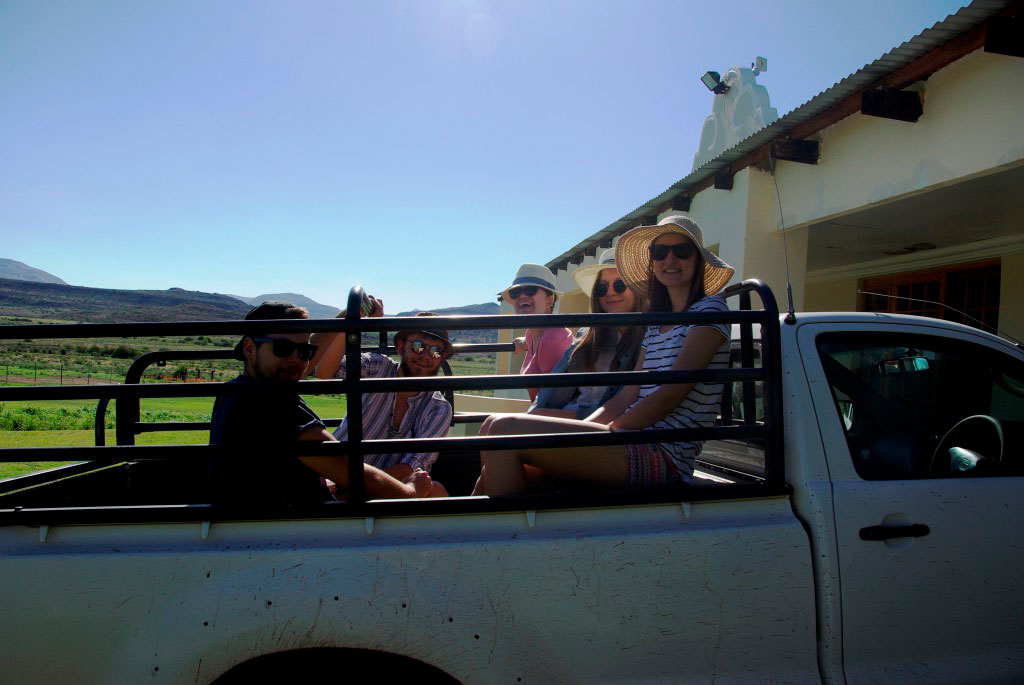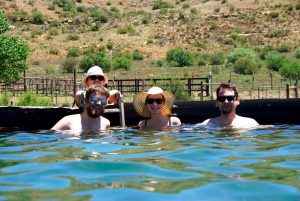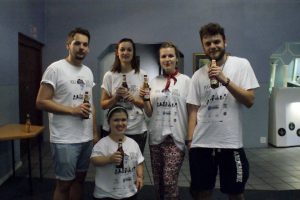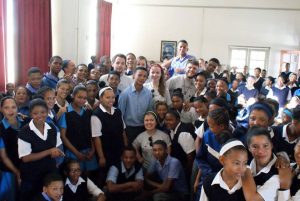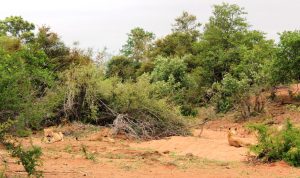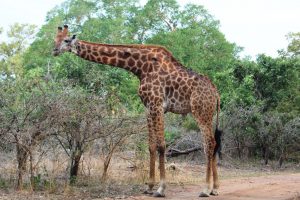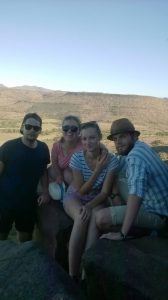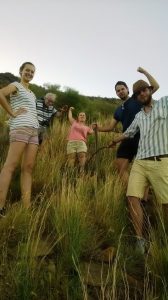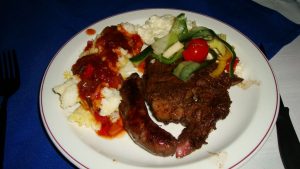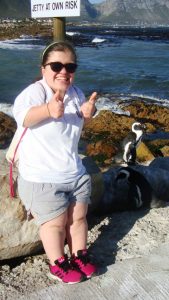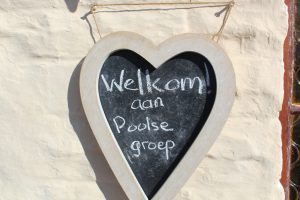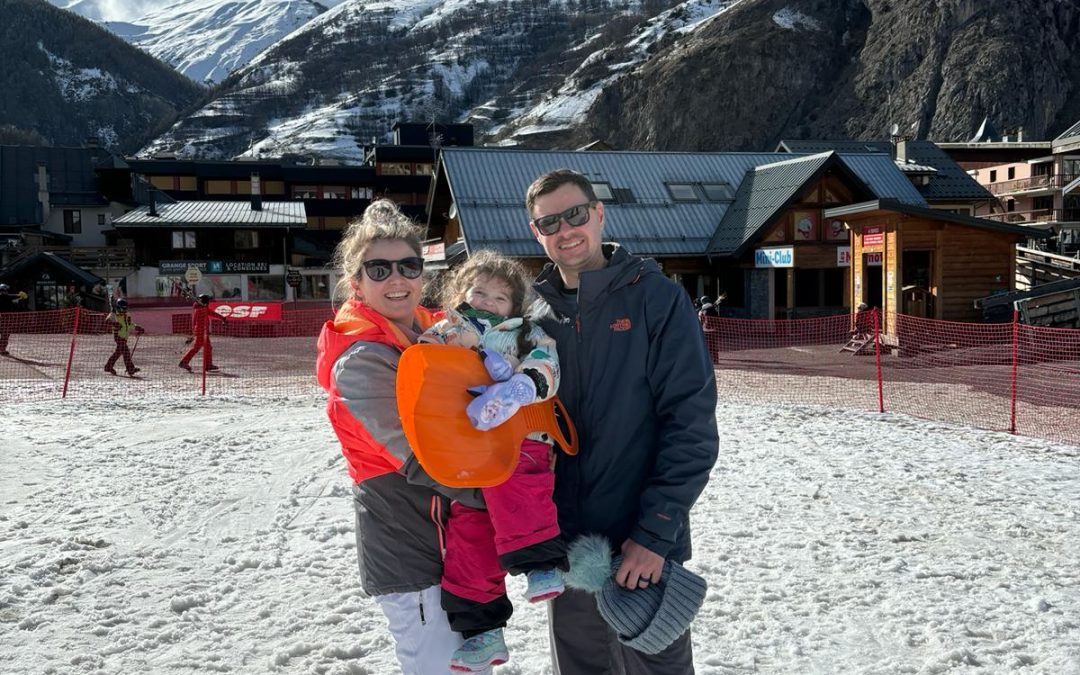In the west of Poland, halfway between the Polish capital Warsaw and Berlin, a small group of Polish students study Afrikaans for a number of years now. This happens at the Adam Mickiewicz University Poznań in the Department of Dutch and South African Studies – also known by its fancy name filologia południowoafrykańska.
Afrikaans as Foreign Language is one of the course offered by the Faculty of English as an adapted and enriched specialisation.
In February this year, five of the third-year students toured South Africa for a month: Chasing the Horizon, they called it. My wife, Antoinette, and I arranged and managed the tour of almost 8 500 km. It was made possible by the financial support of the University, guest parents who received the students, as well as a number of South African sponsors, companies, organisations, trusts and individuals.
AfriForum was yet again a sponsor and kindly treated the group one evening to true traditional South African cuisine. The students had the opportunity there to chat to Afrikaans young people who are members of AfriForum Youth.
We asked the students to write about their experiences for AfriForum Worldwode in Afrikaans. Agata Leśnowolska writes the following – in her own words:
(AfriForum did not edit the students’ letters to allow the reader to see how well they have mastered Afrikaans – red.)
“Die Chasing the Horizon toer was ’n wonderlike ervaring. Om in Suid-Afrika te wees was ‘n droom wat bewaarheid is. Elke dag was ’n avontuur. Elke dag het my perspektief verander. Om te sê wat die beste van die toer was, is soos jou gunsteling kind te kies, onmoontlik.
Ons eerste besoek aan ’n Suid-Afrikaanse skool het my diep aangeraak. Ons het Sutherland Hoërskool besoek. Dit is nie ’n groot skool nie, daar is ongeveer 400 kinders. Ek moet erken dat ek senuweeagtig was, want kinders is ’n baie veeleisende gehoor. Maar dit was ongelooflik! Die kinders was baie gedissiplineerd en het baie in Pole belang gestel. Ons het gesing, gelag en selfs gedans. Drie meisies het ons die ‘reed’-dans gewys. Ek het ook met die skoolhoof gepraat en kinders se vrae beantwoord. Dit was ’n baie gelukkige ervaring vir my om met die kinders interaksie te hê. Ons het waarskynlik meer as die kinders geleer.
Vir twee dae was ons werklike Suid-Afrikaanse boere. Ons het Isak en Karen Britz se ‘OsKop’-plaas naby Burgersdorp besoek. Ons het die eienaars met werk op die plaas gehelp. Ons moes beeste kamp toe lei en skape tel. Ons het geklim, agterop ’n bakkie gery, in die dam geswem en baie biltong geëet. Dit was wonderlik om sulke insig van die alledaagse lewe op ’n Suid-Afrikaanse plaas te kon kry.
Ek mis reeds Suid-Afrika. Ek dink ek sal na die pragtige land terugkeer, wanneer ook al dit mag wees. So asseblief, hou die land in haar goeie kondisie.”
(The Chasing the Horizon tour was a wonderful experience. To have been in South Africa was a dream come true. Every day was an adventure. My perspective changed daily. To say what I liked most about the tour, would be like choosing your favourite child – impossible!
Our first visit to a South African school moved me deeply. We visited the Sutherland High School. It isn’t a large school; there are about 400 children. I must admit: I was a bit nervous, because children can be a very taxing audience. But it was unbelievable! The children were very disciplined and interested in Poland. We sang, laughed and even danced. Three girls showed us the reed dance. I also talked to the Principal and answered the children’s question. It was a happy experience to have had interaction with the children. We probably learnt more than the children!
For two days we were true South African farmers. We visited Isak and Karen Britz’s farm Oskop. We helped the owners with some work on the farm. We climbed [the koppies], rode on the back of a bakkies, swam in the dam and had lots of biltong. It was wonderful to gain such insight into the everyday life on a South African farm.
I already miss South Africa. I think I will return to this beautiful country, whenever that may be. SO, please: keep the country in her good condition.)
Zuzanna Waliszewska writes as follows:
“Dit mag dalk snaaks klink, maar ’n braai, veral die eerste een, was iets wat ek nooit sal vergeet nie. Ons het van ‘braai’ by Professor Olivier geleer. Ek kan onthou hoe ons in die klaskamer gesit en oor wonderlike en smaaklike speserye en maaltye gepraat het. Ek weet dat braai ’n baie belangrik tradisie in Suid-Afrika is, maar ek het nie besef dit vorm so ’n ongelooflike groot deel nie. Die kos was baie smaaklik, maar dit is nie al rede hoekom ek so baie van ’n braai hou nie. Vir my was mense die mees belangrikste deel van die gebeurtenis. Ons kon met mekaar gesels, terwyl ons geurige kos geëet het. Die Suid-Afrikaners is baie gasvry. Dit was wonderlik om met hulle te praat, lag en sing. Dit is die magiese van elke braai – die mense.
Verder het ek die pikkewyne geniet. Dit is iets buitengewoon om pikkewyne in ’n vreeslike warm land, soos Suid-Afrika, te sien. Ek kon nie glo dat ek so naby aan hulle gestaan het nie. Miskien is dit vlak, maar komaan?! In Pole het ons takbokke, bere en wilde varke. Ek sê nie dat Poolse diere nie interessant is nie, maar pikkewyne? Wat kan daarmee kompeteer?
Om in ’n Suid-Afrikaanse huis te woon en om ontbyt en aandetes saam met ’n Suid-Afrikaanse gesien te eet was ’n belangrike ervaring. Ek het so tuis gevoel. Mense het baie vir ons omgegee en dit het my gelukkig gemaak.
Toe ons in Sutherland was, kon ons na die sterre kyk en ek moet sê dat die Suid- Afrikaanse hemelruim van die Poolse een verskil. In die middel van die Karoo was daar ons; vyf Poolse studente wat na die sterre gekyk het. Jy kon die stilte van die gramadoelas hoor. Hoe kan jy jouself nie gelukkig noem nie?
Wat meer is, vir Suid-Afrikaners is die kleur van grond miskien iets gewoon, maar nie vir my nie. Ek kan nie glo dat grond rooi, bruin en oranje kan wees nie. Ek herroep nou nog die beelde. Dit is ’n suiwer skoonheid.
Ek kan oor Suid-Afrika praat en praat en natuurlik skryf en skryf. Ek dink my vriende is al gatvol, maar ek weet ek soek meer. Ek sal terug wees.”
(It may sound funny, but a braai, especially the first one, was something I will never forget. Professor Olivier told us about braais. I remember how we had sat in the class room and talked about wonderful and tasty spices and dishes. I know that braai is a very important tradition in South Africa, but I never realised that it plays such an unbelievably important part. The food was very tasty, but that isn’t the only reason I like braais so much. For me, the people were the most important part of the experience. We could speak to one another while eating flavoursome food. It was wonderful to talk to, laugh and sing with them. This is the magic of every braai – the people.
I also enjoyed the penguins. It was something extraordinary to see penguins in an extremely hot country like South Africa. I couldn’t believe how close I stood to them. Maybe it is stupid, but come on?! In Poland we have stags, bears and wild boars. I am not implying that Polish animals are not interesting, but penguins? What can compete with that?
To have lived in a South African house and to have enjoyed breakfast and dinner with a South African family have been an important experience. I felt so at home. People cared for us deeply and that made me happy.
When we were in Sutherland, we could look at the stars, and I must say that the South African heavens differ from the Polish heavens.There we were in the middle of the Karoo: five Polish students looking at the stars. You could hear the silence of the untamed land. How can you not call yourself happy?
What’s more: to South Africans the colour of sand is perhaps nothing new, but not to me. I cannot believe that sand can be red, brown and orange. I still recall those images. It is pure beauty.
I can talk and talk about South Africa, and, naturally, talk and talk. I think my friends may have had enough, but I know I want more. I will be back.)

